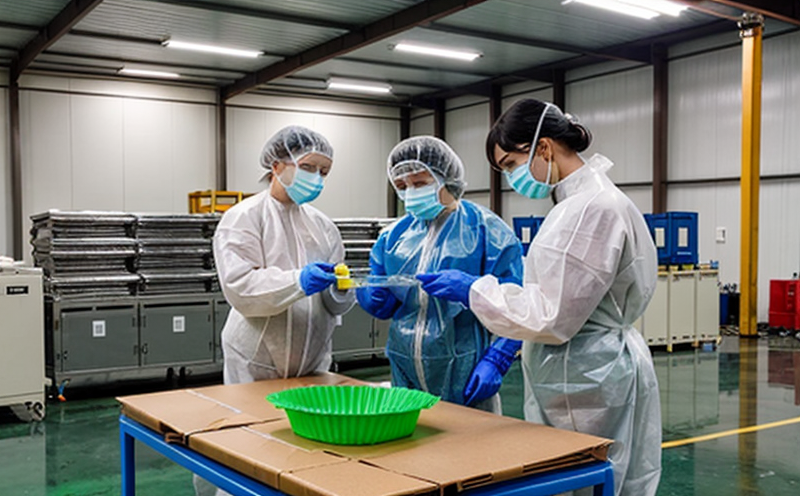ISO 306 Vicat Softening Temperature Testing Limit of Detection and Quantitation Assessment Test
The ISO 306 Vicat softening temperature test is a critical method used to determine the Vicat A or B softening point of thermoplastics. This test measures the temperature at which a standardized needle penetrates into the sample under specified conditions, indicating the onset of plastic flow and deformation. The Vicat softening temperature (TV) is an important parameter in quality assurance, material selection, and process optimization for plastic packaging.
This test is particularly relevant to plastic packaging where understanding the thermal stability of materials is crucial. For instance, in the food packaging industry, knowing the Vicat softening temperature helps ensure that the packaging can withstand the heat associated with sterilization processes without compromising integrity or safety. In the pharmaceutical sector, it ensures that containers and closures remain intact under various storage conditions.
The ISO 306 method involves placing a sample in a heated water bath and subjecting it to progressively higher temperatures while monitoring penetration depth. This test is performed using a Vicat Apparatus, which consists of a needle and a heating block. The specimen must be prepared according to specific dimensions and tolerances, typically a disk or rod.
The significance of this test extends beyond mere compliance; it aids in optimizing material properties for performance and cost-effectiveness. By understanding the Vicat softening temperature, manufacturers can tailor their products to meet both regulatory requirements and market demands. This knowledge is vital for ensuring product longevity and reliability under various environmental conditions.
For quality managers and compliance officers, this test provides essential data that ensures adherence to international standards such as ISO 306. For R&D engineers, it offers insights into material behavior at different temperatures, aiding in the development of new products. Procurement teams can use this information to select suppliers who meet stringent quality criteria.
In summary, the ISO 306 Vicat softening temperature test is a cornerstone of plastic packaging testing, providing critical data for decision-making processes across various industries.
Why It Matters
The significance of the ISO 306 Vicat softening temperature lies in its ability to predict how materials will behave at elevated temperatures. This test is not just about determining a single point but also assessing the overall thermal stability and potential for deformation over time.
- Regulatory Compliance: Many jurisdictions require that packaging meets specific thermal stability criteria, making this test essential for compliance.
- Product Integrity: Ensuring that packaging materials do not soften or deform at inappropriate temperatures is crucial for maintaining product integrity and safety.
- Risk Mitigation: Understanding the limitations of a material helps in mitigating risks associated with potential failures under heat stress.
The Vicat softening temperature test plays a pivotal role in ensuring that plastic packaging materials are suitable for their intended applications, whether it be food storage, pharmaceutical transport, or industrial use. By providing accurate and reliable data, this test enhances the overall quality and safety of products across diverse sectors.
Benefits
- Enhanced Quality Assurance: Ensures that materials meet specified standards for thermal stability.
- Informed Decision Making: Provides data to optimize packaging design and material selection.
- Improved Safety: Helps in identifying potential risks associated with heat-induced deformation or failure.
- Compliance Assurance: Ensures that products meet regulatory requirements for thermal stability.
The ISO 306 Vicat softening temperature test offers significant benefits to various stakeholders within the packaging industry. Quality assurance teams can rely on this data to ensure consistent product quality, while R&D engineers benefit from a deeper understanding of material behavior under heat stress. Compliance officers are provided with critical information to demonstrate adherence to international standards.
International Acceptance and Recognition
The ISO 306 Vicat softening temperature test is widely recognized and accepted across the globe due to its robust methodology and consistent results. This test is part of a suite of standardized procedures used in materials testing, ensuring uniformity and reliability.
- Global Consensus: Developed by ISO (International Organization for Standardization), this method enjoys widespread acceptance in industries worldwide.
- Standardized Procedures: The test follows stringent guidelines set forth in the ISO 306 standard, ensuring consistency and accuracy.
The Vicat softening temperature is not only recognized by industry professionals but also used as a benchmark for quality assurance. Its acceptance by major regulatory bodies ensures that products meeting this criterion are trusted by consumers and regulators alike.
Many countries and regions have adopted ISO 306 as the standard method, making it a crucial tool for global manufacturers. This recognition underscores its importance in ensuring product safety and reliability across diverse markets.





